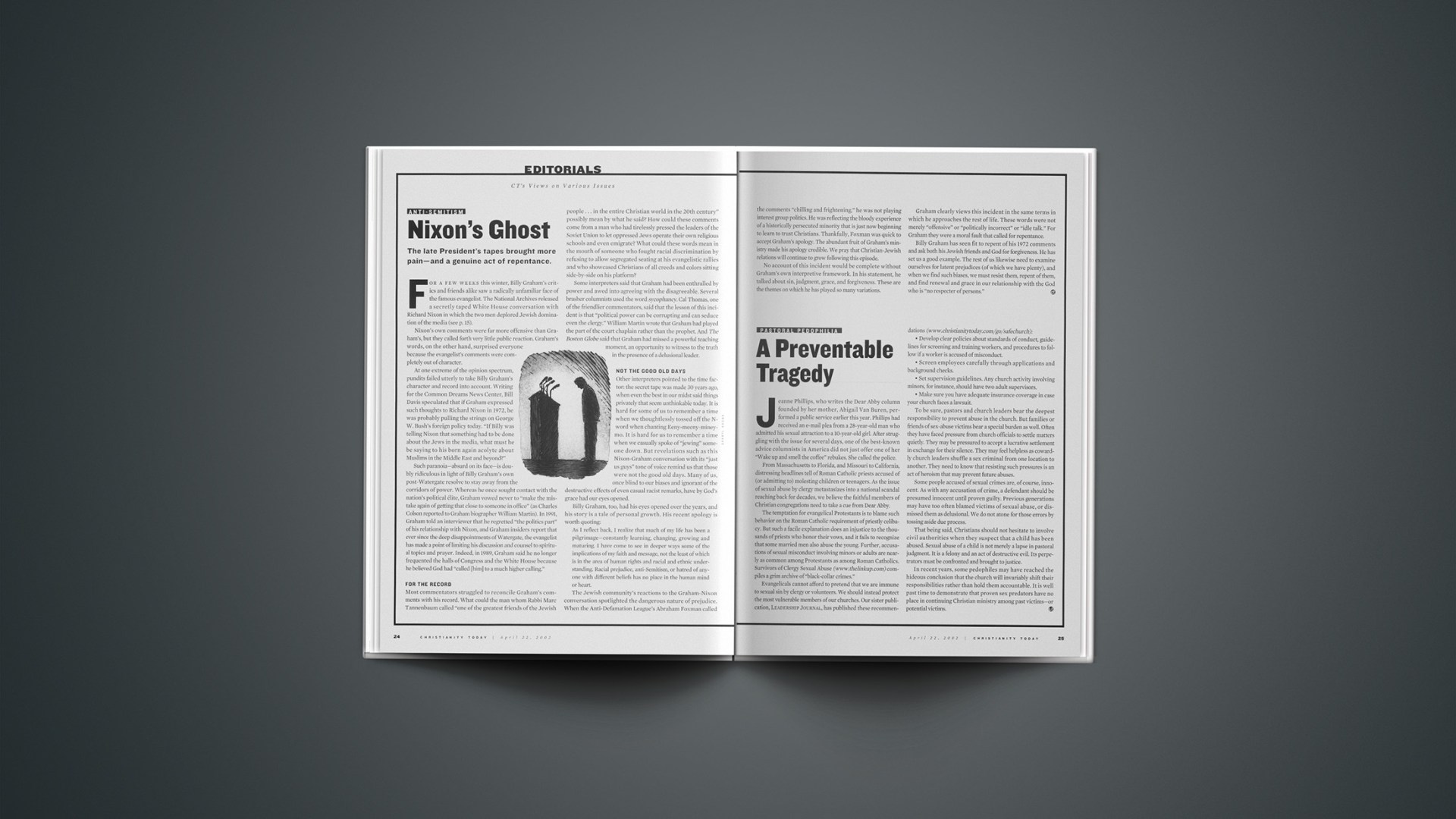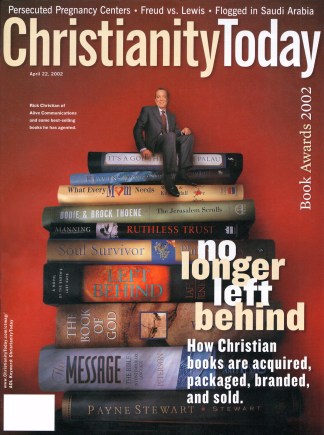Jeanne Phillips, who writes the Dear Abby column founded by her mother, Abigail Van Buren, performed a public service earlier this year. Phillips had received an e-mail plea from a 28-year-old man who admitted his sexual attraction to a 10-year-old girl. After struggling with the issue for several days, one of the best-known advice columnists in America did not just offer one of her “Wake up and smell the coffee” rebukes. She called the police.
From Massachusetts to Florida, and Missouri to California, distressing headlines tell of Roman Catholic priests accused of (or admitting to) molesting children or teenagers. As the issue of sexual abuse by clergy metastasizes into a national scandal reaching back for decades, we believe the faithful members of Christian congregations need to take a cue from Dear Abby.
The temptation for evangelical Protestants is to blame such behavior on the Roman Catholic requirement of priestly celibacy. But such a facile explanation does an injustice to the thousands of priests who honor their vows, and it fails to recognize that some married men also abuse the young. Further, accusations of sexual misconduct involving minors or adults are nearly as common among Protestants as among Roman Catholics. Survivors of Clergy Sexual Abuse (www.thelinkup.com) compiles a grim archive of “black-collar crimes.”
Evangelicals cannot afford to pretend that we are immune to sexual sin by clergy or volunteers. We should instead protect the most vulnerable members of our churches. Our sister publication, Leadership Journal, has published these recommendations:
- Develop clear policies about standards of conduct, guidelines for screening and training workers, and procedures to follow if a worker is accused of misconduct.
- Screen employees carefully through applications and background checks.
- Set supervision guidelines. Any church activity involving minors, for instance, should have two adult supervisors.
- Make sure you have adequate insurance coverage in case your church faces a lawsuit.
To be sure, pastors and church leaders bear the deepest responsibility to prevent abuse in the church. But families or friends of sex-abuse victims bear a special burden as well. Often they have faced pressure from church officials to settle matters quietly. They may be pressured to accept a lucrative settlement in exchange for their silence. They may feel helpless as cowardly church leaders shuffle a sex criminal from one location to another. They need to know that resisting such pressures is an act of heroism that may prevent future abuses.
Some people accused of sexual crimes are, of course, innocent. As with any accusation of crime, a defendant should be presumed innocent until proven guilty. Previous generations may have too often blamed victims of sexual abuse, or dismissed them as delusional. We do not atone for those errors by tossing aside due process.
That being said, Christians should not hesitate to involve civil authorities when they suspect that a child has been abused. Sexual abuse of a child is not merely a lapse in pastoral judgment. It is a felony and an act of destructive evil. Its perpetrators must be confronted and brought to justice.
In recent years, some pedophiles may have reached the hideous conclusion that the church will invariably shift their responsibilities rather than hold them accountable. It is well past time to demonstrate that proven sex predators have no place in continuing Christian ministry among past victims—or potential victims.
Copyright © 2002 Christianity Today. Click for reprint information.
Related Elsewhere
In March, a Christianity Today online exclusive looked at how the clergy sexual abuse scandal affects evangelical churches. Sin and secrecy aren’t limited to Roman Catholics, say pastors and scholars.
Christianity Today sister publication Leadership Journal’s “Safe at Church” recommendations provide important practical steps to minimize the risk of sexual misconduct and to keep children safe. Last summer, Leadership Journal published “Confronted with the ShamefulHow you should respond—legally and responsibly—when a staff member is accused of child molestation.”
Mike Woodruff, a coauthor of the Leadership article, wrote a similar article for the journal Youthworker. “Youth workers are at greater risk for sexual improprieties than most,” he wrote. He gives many very helpful tips for staying above reproach.
Richard Hammar and the Institute for Christian Leadership have several tools for teaching churches how to reduce the risk of child sexual abuse.
Both The Boston Globe and Boston Herald have special areas of their Web sites devoted to covering the clergy abuse scandals.
The Linkup, a group for survivors of clergy abuse, keeps a close eye on “black collar crimes” around the country.
Yahoo’s full coverage area on clergy abuse offers links to news stories and opinion pieces from media around the world.










